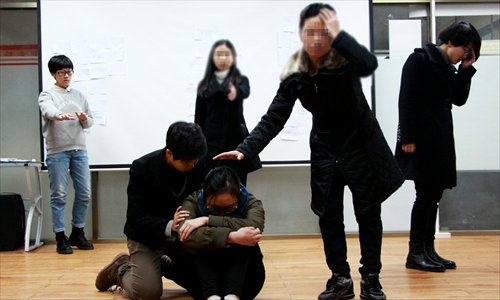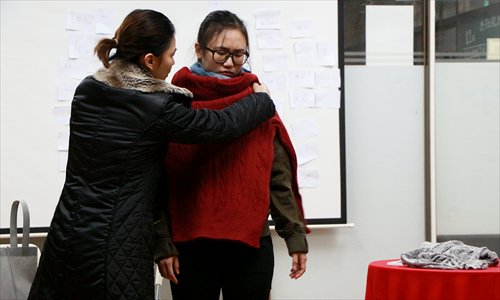LGBT groups use interactive theater to provoke discussion
Some gay rights groups are starting to use theater as a more direct way to communicate with audiences and spark discussion about their place in society. While putting on shows for the public, they've met difficulties, such as lack of performing space, volunteers and homophobic responses from the audience.

Members of the Spring Feminist Society perform a play about a lesbian trying to come out to her friends and family in Guangzhou, Guangdong Province. Some actors requested that their faces be obscured as they are not totally out. Photo: Courtesy of Dada
Tiantian (pseudonym) remembers vividly that while she was in the middle of performing a play in Guangzhou, South China's Guangdong Province, a male college student stood up and announced to the room, "I can't approve of homosexuals, it's a sad thing that they can't have children."
The atmosphere in the theater immediately froze. The actors looked at each other nervously, and Tiantian instantly wanted to reply but held herself back, as another actor, Dada, stepped forward and told the audience that all kinds of viewpoints are welcome.
What could have been a crisis was defused. At the end of the play, during the Q&A session, other students in the audience started disagreeing with the man and more joined the discussion.
Twenty-four-year-old Tiantian is a member of Guangzhou-based Spring Feminist Society, an NGO that aims to use theater to push for gender equality. Starting last year, the organization has put on shows that tackle the issue of homosexuality. Many who came to view their plays are LGBT-friendly, but occasionally there are audience members who react against them.
The disagreeing man belonged to a touring group of Beijing college students who came to see the play out of curiosity. When they came into the theater Tiantian felt tense.
"There were more than 20 people and they all looked very 'straight man,'" she said.
But through these performances, these groups hope to create effective discussion both within the gay community and among the public.
Experimental theater
Tiantian found out about the society through her girlfriend. She went to see a rehearsal and was handed a part in one of their plays. The play was about a woman who faced a hard time with her mother and friends when trying to come out.
The form of the play is called "forum theater." Actors perform a play on stage and if at any point an audience member disagrees with something they see, they can stop the play and replace one or more actors on stage, to create a scene they are happy with.
There's also an overseer in the play, called the Joker, who coordinates audience participation. Afterwards there's a Q&A session, for the audience to communicate with actors. In Dada's opinion, this form of theater works for them because it has a lot of room for audience participation and discussion.
In China, there is a long tradition of using theater to discuss social issues. The Thunderstorm, The Rickshaw Boy and The Teahouse are among the famous plays that present the conflicts in ordinary people's lives in China during changing times.
In recent years, theater is becoming a more popular method for the LGBT community to reach out to the public as gay people are becoming more visible. The vivid stories and emotions displayed on stage can allow a general audience to empathize with people they may not have considered before.
Even groups that didn't traditionally focus on theater are starting to put on LGBT-themed plays. Danlan, a company that developed a gay website and gay dating app, worked in cooperation with an arts company in January and produced a play about gay couples.
Peng Yanhui, an activist from Guangzhou-based NGO Gay Rights Advocacy China, has put on gay plays too, both in Beijing and in Guangzhou. He has chosen the form of "playback theater." People randomly chosen from the audience tell their life stories under an overarching theme, such as "love" or "family," then members of the theater troupe act out their stories.
From last December, a few organizations, including Peng's, launched a series of workshops in a joint effort. They have not yet performed in front of a public audience due to insufficient number of staff, but that's the goal someday, Peng said.
But the first step is to reach out to the LGBT community.
Being in the play has given her more insights into her own life, said Tiantian, since the plot line was based on real stories. A few weeks before Spring Festival this year, she received pressure from her mother to meet a guy and get married.
Her mother conforms to the traditional stereotype of Chinese parents, she is sometimes stubborn, controlling and thinks all this is for her daughter's own good. In a way, she was similar to the mother in the play, who insisted on picking out clothes, accessories and boys for her daughter.
"I could only tell her that I don't want to date, I don't want to marry. I just can't tell her I'm already seeing a woman," Tiantian said.
While the play resonates with her, she also received insights from audience suggestions regarding what to do in the play and her own life.

Members of the Spring Feminist Society perform a play about a lesbian trying to come out to her friends and family in Guangzhou, Guangdong Province. Photo: Courtesy of Dada
Reaching out to the public
When Wei Tingting took on the role of the Joker in a forum theater performance that's semi-open to the public in Beijing last year, she felt the power of audience participation to create discussion.
The play was about a gay man who suppressed his sexuality and got married to a woman, but 20 years later he found out his son enjoys cross-dressing. After being reprimanded, his son runs away, while his wife, who has discovered the truth about the men in her life, is left in shock.
Not long after the play began, a man in the audience stopped the play, saying the father shouldn't hit his son and then started acting out his own version. The mother of a gay man went on stage and had a rational conversation with the son about when he can wear dresses, and when he shouldn't.
Near the end of the play, a woman went up to act as the mother. She cried and accused the father of neglecting the family and lying about his sexuality. Afterwards, the father started crying, apologized, and they went to look for their son together.
"In the end, the theater became a platform for people to talk about typical LGBT-related topics, such as coming out or gay marriage, some discussions are fairly intense," Wei said. She believes such theater can bring the beginning of change for society.
But facing accusations and disagreements is also a part of the theater once it opens up to the public.
Before their play was presented to the general public, members talked about possible ideas and reactions as a group, Tiantian said, but when faced with direct accusations that afternoon from the college student, she felt a little shaky.
At that point, Dada handled matters in a peaceful way. She asked the man to step onto the stage and put the daughter into a position that can reflect how she felt at that moment. He went up, and stretched one of her hands toward the sky, with the other hand covering her chest, hinting that she's helpless and in anguish.
Dada later wrote in her WeChat that she didn't start a discussion at that point because she didn't want the silent audience, who might have the same opinion as the man, to be scared off. She feels that attacking this man wouldn't create discussion on this topic, but divert people away from it. In the end, there was discussion among the students themselves and she felt their goal had been achieved.
But admittedly, LGBT-themed plays are still rare in China. Peng still can't recruit enough staff to put on a public play at this stage because not many in the LGBT community are familiar with this form of theater or are willing to talk about their personal stories. Right now, they are recruiting through word of mouth and not all their actors are totally out.
The Spring Feminist Society is on the beginning stage of performing gay plays as well. It has only been able to perform one so far.
"We have another skit that's about opposing domestic violence, and usually the local community wants us to perform, so does the women's federation or schools, we can perform anywhere," Dada said. "But the situation is quite limited for LGBT-related topics."
Besides, even though the theater can create some discussion, there's still a long way to go in spreading awareness on these issues.
Tiantian hasn't yet reached a consensus with her mother on her dating situation and she doesn't expect she can bring her girlfriend home soon.
"It's difficult to change people's minds through just one play, they need other ways to get to know this community," Tiantian said.
Newspaper headline: Out on the stage